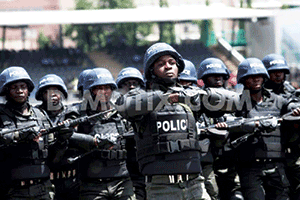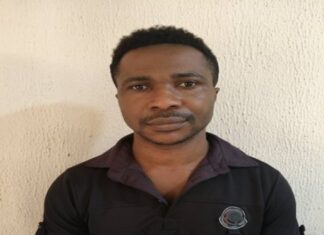Assistant Politics Editor, DANIEL KANU, x-rays the pros and cons of state police that recently received the endorsement of national conference delegates
Going by developments at the national conference, the issue of whether Nigeria is ripe to practise state police or not may have finally been laid to rest.
At various occasions, the federal government, top security chiefs and presidential committees have kicked against the state police idea. Their argument has always been that the system would not only be abused but that states would not be able to meet the financial capacity needed to sustain it.
All such arguments seem to have been upturned at the on-going confab.
It may perhaps be a deliberate strategy by the leadership of the conference to reserve some of the most delicate and controversial issues as matters best suited for final deliberation, when the conference will be winding up.
This is because there appears to be some highly sensitive issues in the agenda of contending zones at the confab, which they may not be ready to shift ground and when not properly and diplomatically handled with common wisdom may bring the confab tenure to an abrupt end.
The calls for the convocation of a sovereign national conference (SNC) to address the socio-economic and political challenges of the nation following the annulment of the June 12 presidential election of 1993 have persisted through the years till date.
This is despite the nation’s return to civil rule in 1999 with the attendant coming into existence of the National Assembly and Houses of Assembly.
The confab as initiated by President Goodluck Jonathan is said to be a national project, a sincere and fundamental undertaking aimed at realistically examining and genuinely resolving long-standing impediments to the country’s cohesion and harmonious development as a truly United Nation.
In Jonathan’s words: “Our sole motivation for convening this conference is the patriotic desire for a better and greater nation; we are determined that things must be done in a way and manner that will positively advance that objective.”
When the conference was inaugurated at the National Judicial Institute (NJI), along Airport Road in Jabi, Abuja, by Jonathan on March 17, 2014, there were over 35 issues pencilled for deliberation.
They included the political restructuring of the country, forms of domestic governance, good governance, judicature/judicial system, democratisation, political parties, godfatherism and the challenges of internal democracy, national security and security challenges, state creation and merger of states, education, health, science, technology and development, restoring national ethics, morals and core values.
There were also issues of religion, secularism and the secularity of the Nigerian state, agriculture, food security and rural development, the environment, defence, tenure of public officials (president, governors, etc.), the Independent National Electoral Commission (INEC) and the challenges of conducting credible elections, population and credible national census, Land Use Act, role of traditional rulers and institutions in governance at national and local levels, the economy, oil and other mineral resources management exploration and sharing mechanism.
Revenue generation and mobilisation, National Youth Service Corps (NYSC), gender issues, youth unemployment and development issues, physically-challenged persons and national development, investment in sports, boundary adjustment, national inland waterways issues, election mayoralty, administrative/legislative structures for the Federal Capital Territory (FCT), Abuja, special status for Lagos, pension matters and rights of senior citizens and Federal Character also featured prominently.
There were also no-go areas, bordering on threat to unity of the nation.
Going by information gathered by TheNiche, political restructuring and devolution of power seem to be the remaining critical areas to tackle.
As part of issues on national security, the conference approved a recommendation for the creation of state police to complement duties of the Nigeria Police. The approval was given during the adoption of report of the Committee on National Security.
The conference adopted the retention of one Federal Police Force that is decentralised to allow participation by states, local governments and communities.
Some delegates had raised concern on the possibility of harmonious co-existence of both federal and state police, considering that their duties might overlap.
Also, they raised apprehension on the appropriate title for commissioners of police in charge of state police and federal police as well as modalities for posting commissioners under the federal system to states.
At the deliberation, according to reports, a voice vote was later taken and delegates voted against seeking the consent of a state governor before the posting of a federal police commissioner to any state. It was gathered that they equally voted against state governors being involved in the running of police commands in their states.
Thereafter, the conference adopted funding of state police by state government and abolishment of monetisation of a special protection unit of the Nigeria Police Force, which seemed to privatise security.
In the same vein, a compulsory life insurance for all armed security personnel, including the police, by government was approved.
The conference had also voted against the proposal to merge the Federal Road Safety Commission (FRSC) and the National Security and Civil Defence Corps (NSCDC) with the Nigeria Police. It had further rejected the call to suspended recruitment of constables for a given period of time within which police training institutions would be upgraded and brought to international standard.
It turned down the proposal for the police to be brought under the Ministry of Internal Affairs. The proposal for the establishment of a police complaint authority and call for women to be given 50 per cent participation in all the security forces were also turned down.
Since the adoption of the creation of state police, there have been mixed reactions trailing the decision. While some political observers say the country was not yet ripe for it, others are of the opinion that it is overdue.
The intense security challenge that is alarmingly on the increase, to most commentators, would have been curtailed if there had been state police, proponents argued.
But the fear of most Nigerians is that the state police would be prone to abuse, even with any legislation to prevent such.
Environmental rights activist, Annkio Briggs, who is a federal government delegate to the conference, had argued recently that state police was part of the components of true federal system of government. She said it was a welcome development as it would afford states better opportunity to provide more reliable security that would endure.
She state: “There should be state police. In other countries, they have federal police. But in America, they have state police, where the police cannot enter another state in a case where they are pursuing a criminal. They cannot cross the border. They have to get authorisation from the other state.
“We have approved state police, though some people are having fears that some governors might abuse its powers. But we will make sure that those powers are not abused because we need state police.
“If we had state police within the areas of the North East, where most of these atrocities right now are being committed, it would have been a different thing. We have to be careful because those atrocities are now moving outside the prone areas of the country.
“So, people will always need to police their areas that they are conversant with, that they can speak the language, where people know them and they know their people.”
Former President, Aka-Ikenga, Igbo intellectual think-tank, Sylvan Ebigwei, expressed reservations over the adoption of state police, as he believed that the nation for now may not be ripe for such enterprise, considering what he described as culture of “prebendal politics”, which he identified as the bane of the nation’s political development. His fear is on the abuse by state governors, no matter the legislation to guard against it.
Also, National Coordinator, Citizens Support Group (CSG), Carl Azudibia, has argued that if fundamental issues were not properly handled, state police would lead to abuse by chief executives of the states.
He expressed reservations on the issue of recruitment, explaining that it may be used as a political weapon against perceived opponents.
“We must resolve the issue of who is an indigene and who is a stranger. It is a fundamental question. We must change state of origin to state of residence, local government of origin to local government of residence,” he proposed.
Azudibia also argued that state police may pose great danger given the ethnic-based nature of the nation’s political development.
He said: “It is not contestable to say that policing is a community thing. It means that the people policing should know the people, strangers and environment very well. To that extent, state police is desirable.
“The question is whether the federation we want to practise suits our nature. Are we really practising true federalism? Have we considered those that will be recruited, whether it will be based on your state of origin or state of residence?
“There is the tendency of the government abusing it, using it as a political weapon against perceived opponents. Have we overcome that nature now? I do not think so. There can be trumped up charges and there will be victimisation.
“If there should be a state police, it means that as one that has been a resident in an area for quite some years, you must have equal chance of being recruited.”
Sometime in 2012, the Presidential Committee on the Re-organisation of the Nigeria Police spoke against the establishment of state police being canvassed by some state governors, arguing that such a move could lead to the dismembering of the country.
Speaking with newsmen then after submitting its report, chairman of the committee, Parry Osayande, said the committee also kicked against the establishment of the Ministry of Police Affairs, as it has no relevance to operations of the force.
The committee, therefore, recommended the review of the salary structure as well as re-tooling of the police with relevant equipment to make it more functional.
Osayande observed that a stronger and more efficient National Police Council with effective participation of state governors, financial autonomy and better professionalism for the police will mitigate the calls for state police.
He said: “State police? It is irrelevant. They cannot afford it. Do you know how much it is to police a country? What we are recommending is that they allow the police council to function.
However, elder statesman, Ayo Adebanjo, said state police should be autonomous and should operate as coordinate with the federal police.
For activist and legal practitioner, Femi Falana, “the state police will maintain state laws while the federal police will maintain federal law.”
Emmanuel Abiodun, a don, told TheNiche: “If Nigerians, not minding their religion or ethnic attachment, develop the right political culture and work towards the unity of the country, the issue of state police would not have arisen. But where some ethnic groups are no longer safe, but slaughtered like animals, there is urgent need for it; so that states can guarantee their security.”













